Understanding Pet Birds' Dietary Needs for Optimal Health
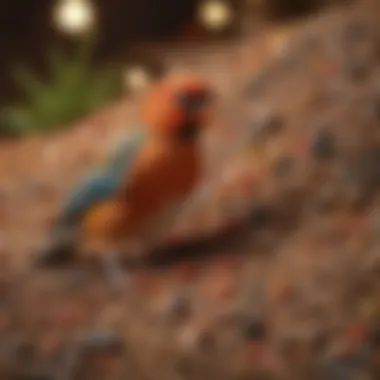
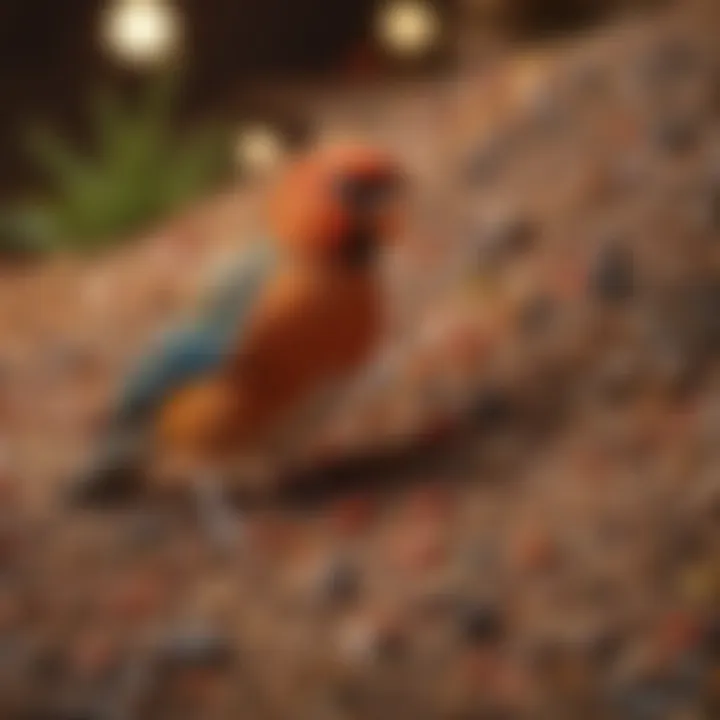
Intro
Avian Care Basics
Importance of Proper Nutrition
Proper nutrition serves as the cornerstone of avian health. Birds rely on a well-balanced diet that includes a mix of grains, vegetables, and fruits. Neglecting their dietary needs can result in serious health consequences, including obesity, feather plucking, and even death. High-quality pellets should act as a primary food source, supplemented with fresh foods to mimic what birds might naturally eat in the wild. It's essential to avoid feeding birds solely on seeds, as this approach lacks essential nutrients that are critical for their well-being.
Understanding Bird Species and Their Needs
Bird species exhibit a broad spectrum of dietary requirements. For example, while cockatiels may thrive on seed mixes, larger parrots like macaws have more diverse needs, necessitating a blend of pellets, fresh fruits, and nuts. Thus, understanding the specific dietary expectations for your bird species facilitates better feeding choices. Researching into particular nutritional needs ensures birds receive appropriate macro and micronutrients, leading to improved health.
Basics of Birds Habitat Setup
An appropriate habitat directly influences a bird's dietary habits. When set up correctly, it fosters an environment conducive to natural behaviors, including foraging and eating a varied diet. Proper cage features, such as perches and feeding bowls, perfectly set the stage for healthy eating and hydration. Ensuring access to clean water is just as essential as providing solid food. Consulting resources or experts on optimal habitat setup can prove invaluable for new bird owners.
Grooming and Hygiene Tips
Grooming goes hand in hand with proper diet, significantly impacting a bird's nutritional absorption. Keeping nails, feathers, and beaks trimmed is vital in preventing feeding complications. Many birds require occasional baths, which helps them maintain feather health. An inviting, clean environment promotes better health, and daily cleaning routines bolster hygiene in food areas, preventing spoilage.
Intro to Pet Bird Nutrition
Proper nutrition for pet birds is a fundamental aspect of their care that can significantly influence their health and well-being. Good nutrition means more than just feeding birds; it involves understanding their specific dietary needs and providing a balanced variety of foods. Bird owners must acknowledge that pet birds have unique nutritional requirements depending on their species, age, and activity levels. By focusing on their dietary needs from an early age, bird owners can help ensure the longevity and vibrancy of their feathered companions.
Importance of Proper Nutrition
Good nutrition for pet birds ensures optimal growth, development, and health. Lack of proper dietary intake can lead to various health problems. Some key reasons bird nutrition is important include:
- Growth and Development: Young birds need particular nutrients, such as protein and vitamins, to support their growth and strong bone development.
- Lifecycle Changes: Birds undergoing molting or breeding phases require special nutritional support to cope with these changes.
- Disease Prevention: A well-balanced diet can stave off issues such as obesity, metabolic disorders, and feather plucking. Quality nutrition can enhance overall immunity.
- Mental Health: Nutritional balance can also impact a bird's mood and activity levels. Certain foods can help facilitate healthy social interactions and adaptability.
Bird owners must realize that what may seem adequate at first could fail to meet the actual requirements of their pet bird over time. Different species indeed have different needs, so** consulting materials and experts** provides a necessary approach to informed bird parenting.
Shortcomings of Commercial Bird Foods
While many commercial bird foods are convenient, there are important shortcomings that can affect a bird's health. Bird owners should be mindful of these deficiencies:
- Imbalanced Nutrients: Some commercial options contain poor nutritional quality or are biased toward seeds or high-fat content. Birds may grow fond of certain types, leading to selective eating.
- Lack of Freshness: Bagged foods, especially organic options, may lose their nutritional value over time. In addition, recommended storing processes may not safeguard freshness.
- Excessive Additives: Occasionally, these foods contain color additives, preservatives, and fillers that offer no nutritional value; instead, they harm digestive health.
- Over-reliance by Owners: Owners often perceive their chosen commercial diets as satisfactory alone, going unnoticed the essential whole foods that should complement bird diets. Often unengaged in the practice of variety can neglect the vitamins and minerals not included increasingly.
Bird owners need to ensure diverse dietary innovations. Their focus should expand beyond just convenience and include principles of nutrition to formulate a proper feeding strategy. A holistic approach includes not only commercial feeding but also understanding body vibrations that informed choices about regular luxury treats and seasonal fruit diversification amid other choices.
Core Components of a Balanced Diet
The nutrition of pet birds heavily relies on a well-rounded diet. This balanced diet serves as the foundation for their physical health, vibrancy, and long-term well-being. Many bird owners might miss the significance of incorporating various food types, resulting in nutrient gaps in the birds' diets.
Seeds and Grains
Seeds and grains often constitute a large part of a pet bird's diet. However, it is crucial to choose the right ones. Seed mixes can be appealing, but they generally offer limited nutrition and may harm your bird's health over time.
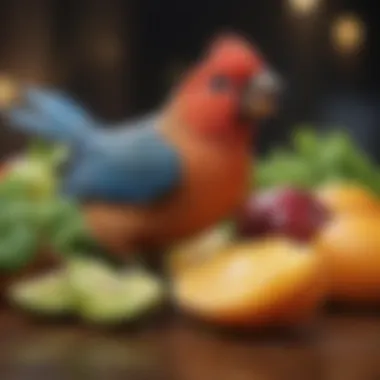
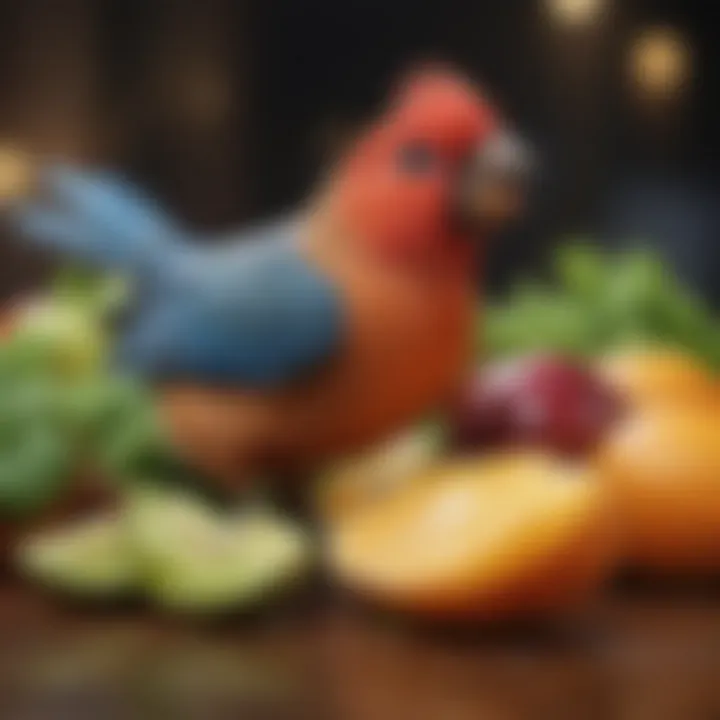
Not all seeds supply essential amino acids and vitamins. For instance, sunflower seeds, while enjoyable, are fatty and should not be the main food source. Consider diversifying by introducing species-specific grain mixes or essential seeds that add variety and nutrition. Quinoa and millet often serve as healthy alternatives, providing aspects like protein and fiber, which support a bird’s digestion and metabolism.
Keeping their feeding fresh and varied is vital as well. Rotating through several kinds of seeds ensures no single dietary component dominates. Make it a routine to evaluate what is consumed and adjust as necessary.
Fruits and Vegetables
Fruits and vegetables are prime offerings in a bird's diet. These foods are critical for hydration along with vitamins. Fresh produce forms necessary vitamins such as Vitamin C, A, and various antioxidants.
Common options include apples, carrots, and greens such as kale or spinach. However, one must meticulously wash fruits and veggies to eliminate possible pesticides or pollutants. Offering a wide spectrum can increase your bird's intake of dietary fibers and other phytonutrients, fostering better health. Keep an eye on the sugar levels of some fruits – moderation assists in keeping your bird at an ideal weight.
Consider introducing these abdominal delights gradually. Often introducing new varieties encourages an adventurous eating habit in your birds without distress.
Ensure you identify any toxic pieces before offering, such as avocados and certain types of fruit pits.
Pellets and Extruded Diets
Pellets represent a convenient and balanced choice for many pet owners. They aim to supply a full range of essential nutrients in a single format. Many reputable brands make these specially designed pellets for specific bird sizes or species.
Extruded diets combine the benefits of various foods in a bite-sized form. Selecting the right option can depend on your pet bird's needs. Opting for high-quality formulas can minimize the likelihood of deficiencies that one may find with other exclusive diets.
While these inputs address key nutritional needs, they should not replace the need for variety entirely. Therefore, it's wise to mesh pellets into overall seeded and grainey diets. This balances texture and flavor while ensuring comprehensive nutritional coverage.
The blend between these three core components nurtures your pet bird's vitality as well as intellect:a consideration every responsible proprietor should prioritize.
Dietary Needs Based on Bird Species
Understanding the dietary needs based on bird species is critical. Different species of birds have unique nutritional requirements. Recognizing these variances ensures each pet bird receives a balanced diet tailored to its specific needs. This section covers key aspects to consider when evaluating dietary needs, benefits of tailored nutrition, and how to ensure optimal health. Providing specialized diets is essential. The wrong diet can lead to health issues such as obesity, malnutrition, and behavioral problems. An informed diet promotes longevity and well-being.
Budgerigars
Budgerigars, commonly known as budgies, require a specific balance of nutrients. Their diet should consist of a variety of seeds, fresh fruits, and vegetables. Smaller seeds should make up about 50-70% of their food intake. This includes millet, canary seeds, and cockatiel seeds.
It is crucial to prevent over-reliance solely on seeds. There are high in fats, which can result in weight gain. In addition, vegetables such as kale, carrots, and bell peppers offer important vitamins and minerals.
Fruits are also an essential part of their diet. However, those are best given in moderate amounts. Avoid fruits that are high in sugar like bananas. Budgerigars thrive on diverse diets. Always ensure clean, fresh water is available, as it is vital for their general health.
Cockatiels
Cockatiels, another popular choice among bird lovers, have similar dietary needs. Their diet requires a variety of foods, comprising seeds, pellets, fruits, and veggies. Seed mixes meant for cockatiels usually contain sunflower seeds, which they often enjoy, but should be fed sparingly due to high-fat content.
A healthy balance should be :
- 30-50% pellets: Should have essential vitamins
- 30% seeds: Use specifically formulated seed mix
- 20-40% fruits and vegetables: Rotate between leafy greens and colorful vegetables
Overall, diets should feature calcium-rich foods. Adding cuttlebone and mineral blocks can help maintain bone health. Be sure to observe individual preferences since it may vary from bird to bird.
Parrots
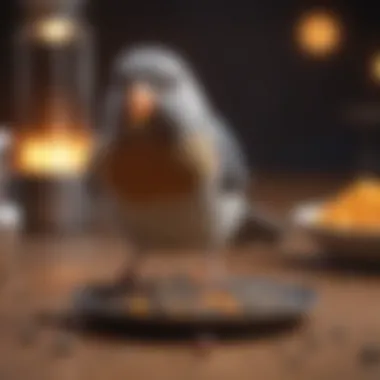
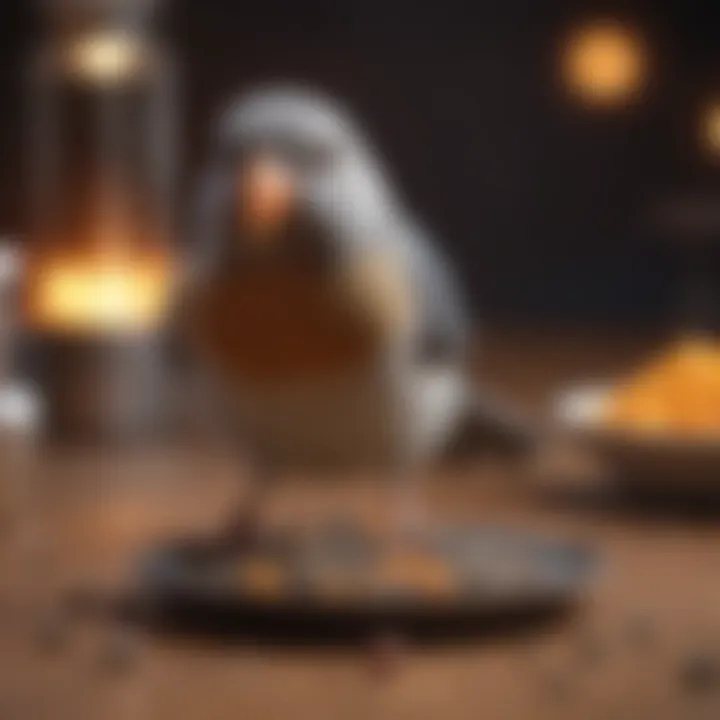
Parrots come in many species, leading to a wide variety of dietary needs. Generally, parrots should eat a mix of pellets, seeds, fruits, and vegetables. Most of their diet can consist of high-quality pellets to ensure necessary vitamins. Seed should complement this in smaller proportions.
Key notes include:
- Dark leafy greens like spinach and collard greens are beneficial. You can also introduce different colors of vegetables to encourage exploration and necessary nutrients.
- Fruits such as berries and apples may enhance their diet, but dry fruits should be moderanged due to sugar levels.
By ensuring a broad diet, you encourage healthy feather growth and overall vitality.
Canaries and Finches
Canaries and finches prefer different seeds compared to larger parrots. Their primary diet should consist of small seeds, such as millets, grains, and some veggies. Fresh greens add variety and minerals needed for health maintenance.
With this, consider:
- Maintain a mix of pez sunflower seed, thistle seed, and canary seed.
- Rotate fresh offerings to avoid boredom.
Typically, these small birds enjoy engaging with their meals. Treats such as chopped vegetables help keep them stimulated and active. Always ensure they have plenty of fresh water to stay hydrated.
Other Exotic Birds
Understanding the dietary needs of other exotic birds is essential, as they vary significantly. Exotic birds, such as macaws or механики ёжики, often require high-fat diets enriched with nuts and seeds.
They eat larger portions of fruits but also need vegetables for balanced health. Safety note: Always research specific species' diets, ensuring to mix game for mental stimulation and adequate nutrition.
Include fortified pellets within their meals, ensuring a variety of food types each feeding. This avoids monotony and encourages exploration in habitats.
A well-rounded diet caters to energy levels and promotes happier, more active birds.
Common Myths About Bird Feeding
Understanding common myths about bird feeding is crucial for pet owners who want to provide the best nutrition for their avian companions. Misconceptions about bird diets can lead to harmful feeding practices. It's essential to address these myths to ensure informed decisions when it comes to the dietary habits of pet birds.
All Birds Should Eat Seeds
A predominant belief among bird owners is that seeds must form the primary diet for all pet birds. While it's true that many birds enjoy seeds, this does not reflect a balanced dietary requirement. Seeds alone usually lack the comprehensive range of nutrients, vitamins, and minerals essential for optimal health. Birds, like humans, benefit from variety in their diet.
Bird species have different nutritional needs. For instance, parrots may enjoy seeds, but they also require fresh fruits and vegetables for crucial vitamins and fiber. Relying solely on seeds can result in malnutrition over time. Additionally, seeds tend to be high in fat, which may lead to obesity and related health problems. Thus, a varied diet will support longer, healthier lives for your birds. An effective approach might involve supplementing seeds with measured amounts of high-quality pellets, fruits, and vegetables, creating a wholesom meal plan that enhances well-being.
Fruits Are Unhealthy for Birds
Another persistent myth circulating is that fruits are unhealthy for birds. At first glimpse, this notion may circulate because of the sugar content found in many fruits. However, nutrition is a broader perspective. Fruits supply vital vitamins, phytonutrients, and minerals that cannot be replaced by other foods, particularly seeds or cheap pellets.
It is important to offer fruits as part of a more extensive dietary plan, making sure to choose a wide variety. Options like apples, bananas, and berries can be nutritious, but also account for avian preferences. It is when pet owners deny these healthy snacks that they lose out on important nourishment their birds require. Moderation is key, as with all dietary components. Prioritize feeding varieties of fruits that do not contain toxic compounds, like avocado or certain berries, to ensure safety and well-being for your feathered friends.
Proper understanding of these myths can significantly enhance the care provided to pet birds and promote better overall health.
Breeding awareness about these two myth topics, pet owners can prevent nutritional deficiencies and establish diverse diets. Fostering correct feeding practices contributes immensely toward avian health, addressing both a pet's physiological needs and natural behaviors.
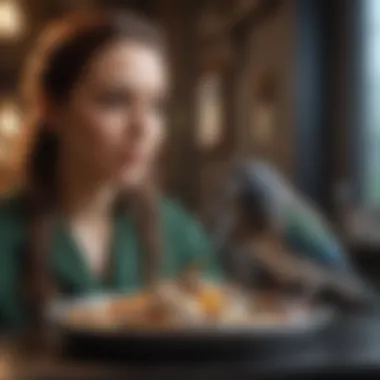
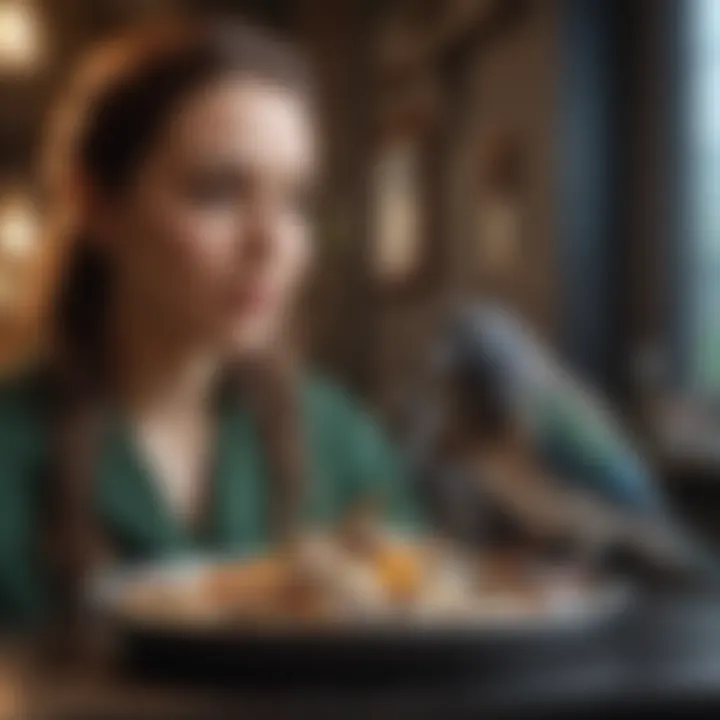
Potential Dietary Pitfalls
Understanding dietary pitfalls is critical for pet bird owners. Many birds can develop health issues due to improper feeding practices. A balanced diet is essential for metabolic health, feather quality, and overall well-being. Common misconceptions can result in feeding habits that may detracted from a bird's nutritional needs. Recognizing and addressing these pitfalls ensures that your feathered friend remains healthy and vibrant.
Over-reliance on Seeds
One prevalent issue among bird owners is the over-reliance on seeds. Many people think all birds love seeds, and they are indeed a favored food. However, a seed-only diet lacks several necessary nutrients and may lead to obesity, liver diseases, and even shortened lifespans.
It's essential to balance seed consumption with other food types. Seeds tend to be high in fat, and excessive fat can lead to health problems. In contrast, fruits and vegetables offer diverse vitamins and minerals. Pellets provide a specific nutrient blend that seeds alone can’t deliver.
To correct this issue:
- Gradually replace seeds with high-quality pellets.
- Introduce fruits and vegetables that are safe for birds.
- Monitor bird weight and energy level regularly.
Pet owners should understand that a diet heavy in seeds might not sustain the health requirements of their animals. Consulting a vet can illuminate tailored dietary needs. Remember, education leads to informed choices.
Neglecting Variety
Another significant pitfall is neglecting variety in a bird's diet. Birds need a wide range of foods to fulfill their nutritional needs. Feeding the same food types regularly can limit nutrient intake, resulting in deficiencies.
Birds can get bored with a static diet, which can discourage healthy eating habits. A diverse diet can also provide mental stimulation, which is crucial for a bird's behavioral well-being. Foods to consider include assorted fruits, various vegetables, and grains, alongside fortified pellets.
When introducing new foods:
- Start slowly to prevent digestive issues.
- Observe your bird's reaction to new foods, adjusting as needed.
- Rotate different options weekly.
By creating a varied diet rich in colors and textures, you promote better health and a more engaged pet. Keeping meals interesting for birds combats monotony and enhances their quality of life. Always consider the overall dietary impact and strive for balance.
Consulting with Veterinary Professionals
When it comes to the intricate world of avian nutrition, enlisting the guidance of veterinary professionals is invaluable. Veterinarians who specialize in avian medicine possess specialized knowledge regarding the dietary needs of various bird species. They aid bird owners in creating an optimal dietary plan tailored to their pets. Consulting with a vet should not be an option; it needs to be a vital part of responsible bird ownership.
Recognizing Nutritional Deficiencies
Inherent in bird care is the responsibility to recognize potential nutritional deficiencies that can detrimentally affect your pet's well-being. Many birds exhibit subtle signs of health issues, making it essential for pet owners to stay vigilant. Common indicators include changes in behavior, plumage quality, and energy levels. For instance, feather abnormalities or lethargy often hint at deficiencies in essential nutrients.
Consulting with a veterinarian can help keep these deficiency symptoms in check. They may conduct blood tests to evaluate overall health and confirm specific vitamin or mineral shortfalls. This proactive approach allows for timely intervention, which can dramatically improve your bird's quality of life. As wounds do heal, recognizing that birds do not always show hardships directly is a leap towards better avian health management.
Tailoring Diets to Individual Needs
Every bird species, even individual birds within those species, has distinct dietary requirements that can be influenced by age, health status, and level of activity. A generic feeding regimen may fail to address these individual needs effectively. This is where the conversation with a veterinary professional becomes immensely beneficial.
Birds are not just entertainers in our homes; they are unique beings with dietary preferences and peculiarities that must be respected. Mini assessments can pinpoint what food types best support individual birds. Ensuring the right balance between seeds, fruits, and other nutrient-dense foods is crucial in this context. These discussions can uncover specific feeding strategies plus suggestions for specialized products like Harrison's Bird Foods or Zupreem. By collaborating with a veterinary expert, pet owners ensure they provide meals that can fully support their animal’s unique lifestyle and biology.
"Preventive care by consulting veterinary professionals can enhance the longevity and happiness of pet birds in unmatched ways."
Taking the time to engage with an avian vet lays the best foundation for healthy living and reinforces the bond between bird and owner.
Closure
Providing a well-balanced diet to pet birds is crucial for their overall health and well-being. This article delves into the multifaceted aspects of avian nutrition, emphasizing the importance of informed feeding practices. By understanding the dietary needs specific to each bird species, pet owners can create a feeding regimen that supports not only physical health but also psychological well-being.
The significance of knowledge about nutrition cannot be overstated. A well-informed owner is significant in ensuring that feathered companions receive all necessary nutrients. For instance, enthusiasts often regard seeds as staple food, yet this misconception can lead to harmful imbalances. Educating oneself about diet composition ensures birds thrive instead of merely surviving.
Considerations about diet variety are evident as well. A monotonous diet will eventually weaken a bird’s health. Consequently, owners should strive to diversify meals with fruits, vegetables, and high-quality pellets. This leads to a more engaging feeding experience and covers essential nutritional requirements.















